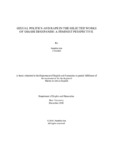| dc.contributor.advisor | Noman, Abu Sayeed Mohammad | |
| dc.contributor.author | Sen, Nandita | |
| dc.date.accessioned | 2020-07-19T13:22:01Z | |
| dc.date.available | 2020-07-19T13:22:01Z | |
| dc.date.copyright | 2019 | |
| dc.date.issued | 2019-12 | |
| dc.identifier.other | ID 17263001 | |
| dc.identifier.uri | http://hdl.handle.net/10361/13886 | |
| dc.description | This thesis report is submitted in partial fulfilment of the requirements for the degree of Masters of Arts in Teaching to Speakers of Other Languages, 2019. | en_US |
| dc.description | Cataloged from PDF version of thesis. | |
| dc.description | Includes bibliographical references (pages 57-61). | |
| dc.description.abstract | Since the early revolutionary period of the first wave of feminist movement in India in 1850,
women have come a long way with the feminist liberation movements continuously striving
to bring in reformation in various fields—social, economic, political, etc. to ensure equality
for women. However, despite all the reforms and changes brought in by these movements,
women are still subjected to constant threat of oppression and assault not just in public
places, but also at their homes and workplaces. Oppression, not just in the form of physical
torture and molestation, but also in the form of ‘mental rape’ is an issue that has been left
unspoken for decades due to fear of ignominy and stigmatization. In order to bring these
‘unspoken’ issues in focus, Shashi Deshpande has made earnest attempts to articulate the
aspirations of these oppressed women through her writings. The works of Deshpande are
reflective of the condition of contemporary Indian women—their struggle for identity and
recognition in a society dictated by a male-dominated structure of patriarchy. This paper
attempts to examine the two novels The Binding Vine and That Long Silence authored by
Shashi Deshpande from the feminist perspective, and investigate the issues concerning sexual
politics, women’s oppression and violence through an application of feminist literary
criticism and postcolonial theories. In addition, the paper will investigate the concept of
‘sexual politics’ and ‘rape’ by scrutinizing the underlying factors including the historical,
religious, socio-cultural and legal elements that have been instrumental in the construction
and shaping of ‘sexuality’ in contemporary Indian society. | en_US |
| dc.description.statementofresponsibility | Nandita Sen | |
| dc.format.extent | 61 pages | |
| dc.language.iso | en | en_US |
| dc.publisher | Brac University | en_US |
| dc.rights | Brac University theses are protected by copyright. They may be viewed from this source for any purpose, but reproduction or distribution in any format is prohibited without written permission. | |
| dc.subject | Liberation | en_US |
| dc.subject | Rape | en_US |
| dc.subject | Patriarchy | en_US |
| dc.subject | Identity | en_US |
| dc.subject | sexual politics | en_US |
| dc.subject | Oppression | en_US |
| dc.subject.lcsh | Women | |
| dc.subject.lcsh | Feminism--Political aspects | |
| dc.subject.lcsh | Feminism | |
| dc.title | Sexual politics and rape in the selected works of Shashi Deshpande: a feminist Perspective | en_US |
| dc.type | Thesis | en_US |
| dc.contributor.department | Department of English and Humanities, Brac University | |
| dc.description.degree | M. in English | |

